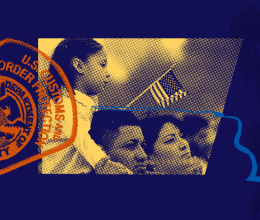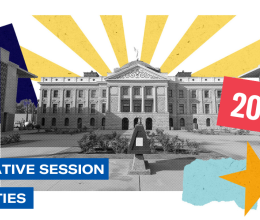The ACLU of Arizona recently filed a friend-of-the-court brief arguing that Arizona officers cannot prolong a stop to conduct an immigration check. Due to a broad misunderstanding of Arizona’s flagrantly anti-immigrant law, SB 1070, David Green’s Fourth Amendment rights were violated when he was unconstitutionally held so an officer could conduct an immigration check.
In 2010, Arizona passed SB 1070. The ACLU has challenged the constitutionality of this law numerous times since its inception and, over the years, many parts of SB 1070 have been struck down by the courts. Unfortunately, Section 2(B), otherwise known as the “show me your papers” provision, still stands.
Section 2(B) of SB 1070 requires Arizona law enforcement officers to determine (or attempt to determine) a person’s immigration status only in two limited circumstances: (1) when the officer arrests a person for a state law crime (like DUI), or (2) when the officer detains a person on suspicion of a state law crime and the officer, during the course of the stop, develops reasonable suspicion that the person “is an alien . . . unlawfully present in the United States.”
In September 2016, the Arizona attorney general issued an opinion providing guidance to agencies regarding how to implement SB 1070. Nevertheless, confusion about how to enforce the law abounds among law enforcement officers in Arizona and people’s rights are routinely trampled.
In the case of David Green, the circumstances that allow an officer to determine a person’s immigration status were not present. Mr. Green was pulled over for a traffic stop but was neither arrested at the time of the check nor suspected of being in the country unlawfully. Under the mistaken belief that the law required it, the officer unconstitutionally prolonged Mr. Green’s stop to conduct an immigration check.
The officer’s actions violated the Fourth Amendment, which prohibits unreasonable searches and seizures by government agents. An officer should never detain someone for longer than is necessary to investigate the traffic or criminal matter that justified the original stop. Prolonging the stop to pursue unrelated, non-criminal investigations would result in a violation of the Fourth Amendment.
To date, after eight years of litigation and heated debate, no state court has ever interpreted the meaning of Section 2(B), despite the fact that six years ago, the U.S. Supreme Court gave that responsibility to state courts. The ACLU of Arizona has worked tirelessly to collaborate with Arizona police agencies to help develop clear immigration-related enforcement policies that protect the civil rights of community members—but there is still much work to be done. This case offers the court the first opportunity in SB 1070’s existence to clarify the specific obligations that the “show me your papers” provision actually imposes on law enforcement agencies statewide.





